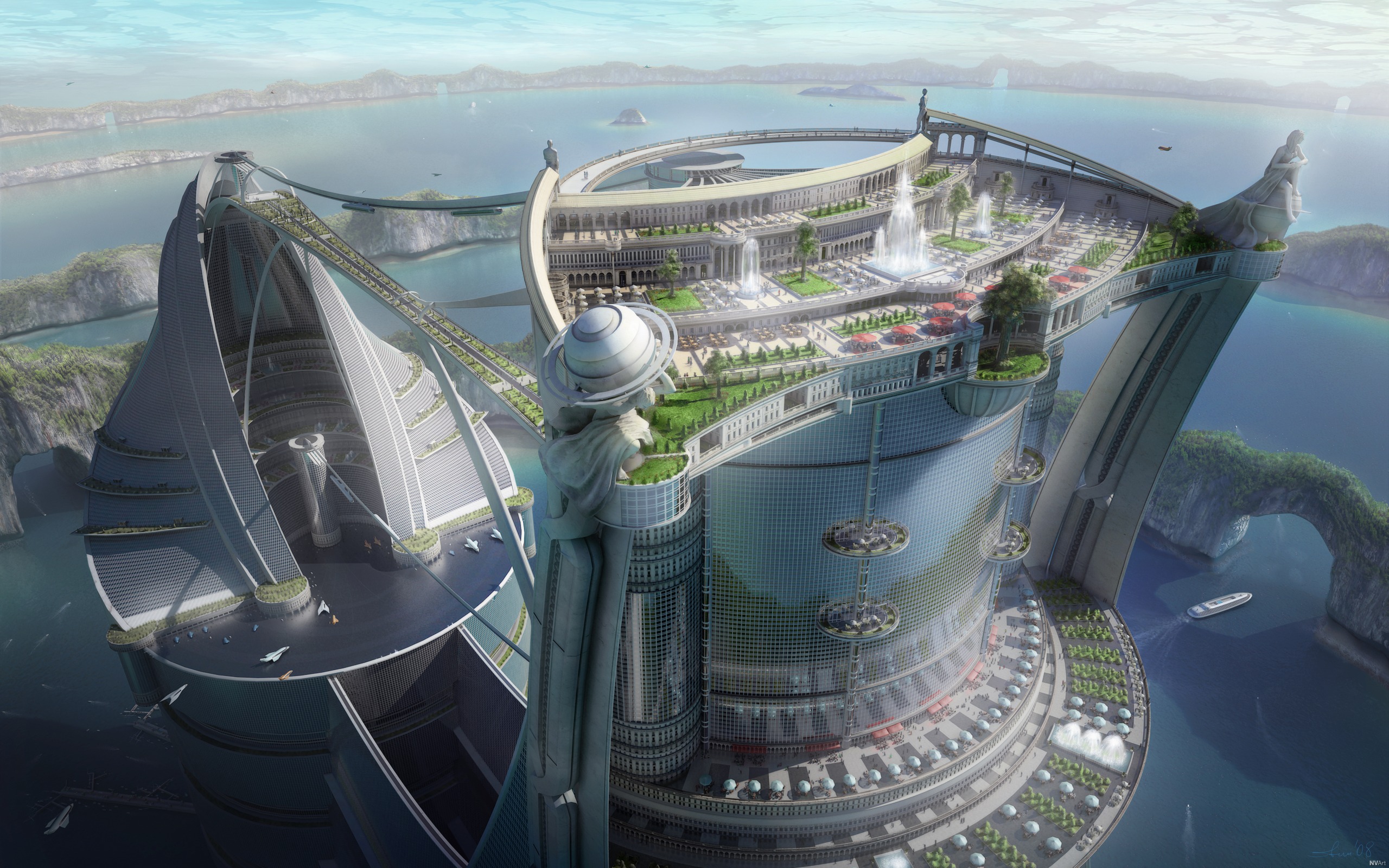Shining City: Oh, my, yes. If there is a city anywhere in the Empire that isn’t competing in these leagues, it’s because it’s pursuing some other stylistic city trope just as hard as it can.
And in various styles, of course, riffing off their general tastes in Art Deco, Crystal Spires, and Raygun Gothic: the seashell spirals of Cileädrin, the black stone geometries of Leirin, the coral spires and glass-blown bubbles of Lochrannach, the living wood palaces of Veranthyr, the flying – well, hanging off the end of an orbital elevator – multi-leveled golden towers of Mer Covales, the mother-of-pearl pleasure domes of Ameri, the crystal domes of undersea Alaerlor, the vaulted, polished caves of Azikhan, the glittering gemstone pillar-arcologies of Dal Shan, the amber-and-marble mandala streets of Ellenith, the three-dimensional fractal layout of Voxelville, the mile-wide cavern parks of Silverfall City… and so forth.
While enabled by post-scarcity economics, it’s not a product of them and predates then considerably. It’s a product of a species and a culture with very firm ethical opinions on the subjects of beauty, wealth, and excellence, and equally firm aesthetic opinions on visible manifestations of entropy1. Helped along, for that matter, by certain necessities of leadership of a people who universally fail to intimidate worth a damn and are very bad at responding to crude bribery, but who can be impressed. Ergo, dear city founder, you must manifest impressiveness, and architecture is a good place to start.
The ultimate example, of course, is the Empire’s capital, “Eternal Calmiríë, the jewel at the heart of the World”, founded back in the day by Alphas I Amanyr and Seledíë III Selequelios, such that neither existing pre-Imperial capital would have priority over the other. Founded – and bear in mind this was well before the local Industrial Revolution – using the simple principle of going to the biggest damn mountain on the Cestian continent, and saying, “That? Right there? Make it a city.”
Note: not build a city on it. Not even build a city in it, although both of those things happened as part of the project. Turn the entire mountain above and below into a city, complete with all the soaring towers, shining buildings, garden parks, multi-hundred-foot-high statues, fountains, waterfalls, monuments, promenades, giant Tesla coils, shining aureoles of fey light, etc., etc., to be expected of the stone upon which the Dragon Throne rests, the temple of unsurpassed grace and shining beauty, the seat of wisdom ever-growing and power never-failing, and so on and so forth.
Alphas and Seledíë were many things, but small thinkers was not one of them. Especially since, you may note, they had very good reasons to build a capital that could out-impress everyone, everywhere, anywhen.
So returning to the general case, sort of like this:
(The above is an Nvidia test image, named “Complex at the Center of the Universe”, about which the TV Tropes page cross-links to Your Head A Splode. It’s worth clicking through to the full-size image and appreciating all the little details.
This is relevant, in particular, because it would be entirely accurate and unexaggerated to say that your modern Imperial city planner or arcology designer will look at this and thing, “Hm. Not bad. A little modest, but a good place to start.”)
1. And the reality behind those visible manifestations, of course. It would be hurtfully inaccurate to say that the great and near-great worked so hard to abolish poverty just because it offended their sensitive souls to have to look at it, or rather put up with the knowledge that it existed in their personal universes. But it was a nice bonus.

